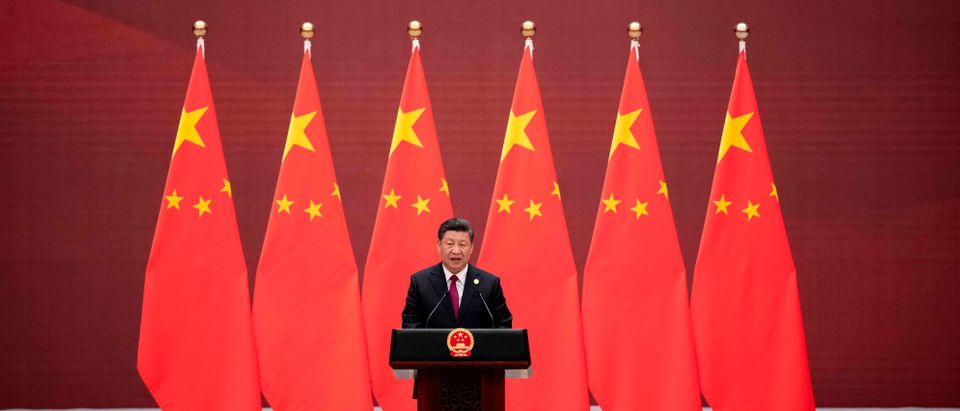When Americans think about conflict with China, Taiwan comes to mind first.
Yet there’s a front off our shores as well, in the Caribbean.
Visit almost any island in the region, and you’ll confront evidence of Beijing’s reach.
Ten Caribbean nations participate in China’s “Belt and Road” initiative — Grenada, Jamaica, the Dominican Republic, Antigua and Barbuda, Barbados, Dominica, Trinidad and Tobago, Guyana, Suriname and, of course, Cuba.
These states owe much of their modern infrastructure, from roads and ports to energy and telecommunications, to Beijing’s patronage.
In Antigua, China Civil Engineering Construction Corporation built a new terminal for VC Bird International Airport. (RELATED: GORDON CHANG: China Is Setting Up Shop In America’s Backyard. Here’s Why You Should Worry)
In Jamaica, China Merchant Port Holdings owns the Port of Kingston outright.
Another Chinese company, Hutchison Ports, holds a controlling stake in the port complex at Freeport in the Bahamas.
Solar panels, health clinics, sports stadiums — Beijing underwrites them all.
“Chinese development banks offered a less time-consuming process than Western-dominated multilateral lending institutions, demanded less transparency and disclosure, and were often willing to supply credit at below market interest rates,” explains Scott B. MacDonald in a recent report for the Jamestown Foundation.
The United States prides itself on upholding a “rules-based international order.”
But for developing states, the rules can be expensive and burdensome.
China offers a cheap, no-questions-asked alternative.
Unfortunately for the borrowers, “in some cases the fine print” includes “the option that, in the event of failure to pay, the Chinese lending institution would assume control of the asset in question.”
Nations that don’t sell their sovereignty willingly nonetheless face “the possibility China could use leverage gained through lending or ‘debt-trap diplomacy’ as a means for Beijing to gain control over strategic assets like harbors and railways.”
China puts its economic pull to maximum political effect.
In 2018 the Dominican Republic broke diplomatic ties with Taipei and declared Taiwan “an inalienable part of Chinese territory.”
Earlier this year, Honduras followed suit.
Now part of Belt and Road, Honduras stands to gain greater investment in hydroelectric power, among other perks.
Chinese influence throughout Latin America is growing, but the Caribbean has special significance.
Five of the remaining 12 United Nations member states that recognize Taipei as a national capital are Caribbean — Haiti, St. Kitts and Nevis, St. Lucia, St. Vincent and the Grenadines, and Belize.
Even if China can’t lure them all into Belt and Road, these countries increasingly have to think about Beijing as they navigate relationships with their own neighbors.
China’s strategic interests are now locally embedded.
Where superpowers are concerned, globalization is never just an economic phenomenon. It’s political — and military — too.
Diplomatically isolating Taiwan is one of China’s aims in the Caribbean.
Another is to exploit American sensitivity to provocations in our own backyard.
Today China has a larger navy than we do but can’t compete with the combined forces of our navy and those of our Pacific allies.
The best chance China has to win a war with us is to divide our attention.
The very extent of our power is also its limitation — we’re responsible for Europe’s security as well as that of our allies in Asia. We police the Persian Gulf and elsewhere as well.
But unlike every other superpower of the last century, we don’t face any serious challenges in our own hemisphere. That frees us to project power far from our own shores.
The past hundred years are replete with examples, however, of how strongly we react when we do fear trouble close to home.
The 1917 Zimmermann telegram, which showed Germany seeking to enlist Mexico as an ally in the event of U.S. entry into World War I, actually spurred the U.S. to get into the war.
The threat a Soviet-aligned Cuba posed to U.S. security forced John F. Kennedy to consider direct military intervention in support of the Bay of Pigs invasion in 1961.
Kennedy balked — and a year later faced the Cuban Missile Crisis.
Even at the end of the Cold War, an increasingly repressive Communist regime in Grenada triggered a U.S. invasion.
President Ronald Reagan’s actions in Grenada contrasted with his response to Islamic Jihad’s bombing of a Marines barracks in Lebanon the same week in 1983.
Why did Reagan withdraw troops from Lebanon — after an attack that killed 241 U.S. military personnel — when he was willing to go to war in Grenada for the safety of American medical students?
The answer lies in the exceptional sensitivity of our strategic underbelly. (RELATED: GORDON CHANG: Chinese Agents Are Slipping Across Biden’s Broken Southern Border)
If a rival like China wants to divert America’s attention from Asia, even a modest nuisance in the Caribbean might suffice.
Right now, China’s capacity to stir up such a commotion is limited.
But the more sway Beijing gains over the economically vulnerable and politically fragile states of the Caribbean, the more the potential for mischief grows — mischief that could shake the world order.
Daniel McCarthy is the editor of Modern Age: A Conservative Review. To read more by Daniel McCarthy, visit www.creators.com
COPYRIGHT 2023 CREATORS.COM
The views and opinions expressed in this commentary are those of the author and do not reflect the official position of the Daily Caller News Foundation.
All content created by the Daily Caller News Foundation, an independent and nonpartisan newswire service, is available without charge to any legitimate news publisher that can provide a large audience. All republished articles must include our logo, our reporter’s byline and their DCNF affiliation. For any questions about our guidelines or partnering with us, please contact licensing@dailycallernewsfoundation.org.


